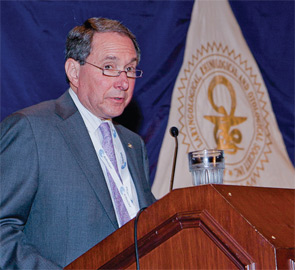
Triological Society members should strive to achieve leadership, legacy and succession, said Society President Robert H. Ossoff, DMD, MD, FACS.
Dr. Ossoff, who gave the Presidential Address here on April 20 at the Triological Society’s 115th Annual Meeting, is Maness Professor of Laryngology and Voice and assistant vice chancellor for compliance and corporate integrity at Vanderbilt University School of Medicine. The meeting was held as part of the Combined Otolaryngology Spring Meetings.
Leadership
“It’s my strong belief that as physicians and members of the Triological Society we have both an obligation and responsibility to be leaders regardless of where we find ourselves,” Dr. Ossoff said.
He noted instances in which otolaryngologists must exhibit leadership skills, such as when interacting with children who have congenital anomalies or with adults who have head and neck cancer. “During times of suffering and pain, patients turn to us for leadership, reassurances and guidance. How many times have you been asked by a patient, regarding the course of treatment, ‘If it were you, what would you do?’ Most of the time the answer is not easy. The new term for this is ‘patient centeredness,’ but what it comes down to is being close enough to the patient and family to know their values and what is important to them.”
It’s easy to diagnose stage-four laryngeal carcinoma, he continued, but it’s another thing to “predict if the patient in front of you will be able to walk his daughter down the aisle next year.”
Otolaryngologists, Dr. Ossoff said, exhibit integrity when they choose to do the right thing even “when no one is looking,” such as when questioning lab results or following up with a patient who didn’t return as scheduled.
He also noted that otolaryngologists often extend their leadership skills to positions with medical societies, their local communities and schools. These duties are “often performed without remuneration and out of a sense of gratitude for all that was given to us,” he said.
Otolaryngologists should keep these leadership goals in mind, he said, by inserting themselves into ongoing discussions with government and private insurers about new payment systems. “We should take a leadership role in decisions that affect our specialty,” he said.
Legacy
Dr. Ossoff said legacy is often thought of as something left behind, but a true legacy results in lasting contributions to one’s community, family and students. As an example, he noted how, in 1961, Dr. William House and colleagues began work on a single channel cochlear implant device, an accomplishment that led to the development of the sophisticated cochlear implant devices of today.
“As we think about our future, we recognize the value of hard work and continual labor to become the best otolaryngologists that we can be,” he said. “As we strive to offer the best patient care, we recognize that despite some of our best efforts, our patients will succumb to their diseases. However, we will be there to comfort and provide care to their families in times of need.”
Succession
An integral part of one’s legacy involves establishing a path for succession, Dr. Ossoff said. “A great deal of our time is spent teaching nurses, allied health professionals, residents and fellows. To successfully mentor someone, it is essential to understand what their aspirations are and support their path in the future.” For example, if a younger physician were interested in an academic career, it would be important to provide advice on conducting research and getting published.
He said it’s also important to establish a path for younger doctors by which they can transition to positions of leadership. Otolaryngologists can do this by sending younger faculty members to hospital meetings or by nominating residents and fellows for society positions, he said.
“Leadership, legacy and succession share one common attribute in that they mean realizing that it is no longer about you but much more about those around you…becoming successful by observing those values they observed from you as a doctor,” Dr. Ossoff said.
Leave a Reply